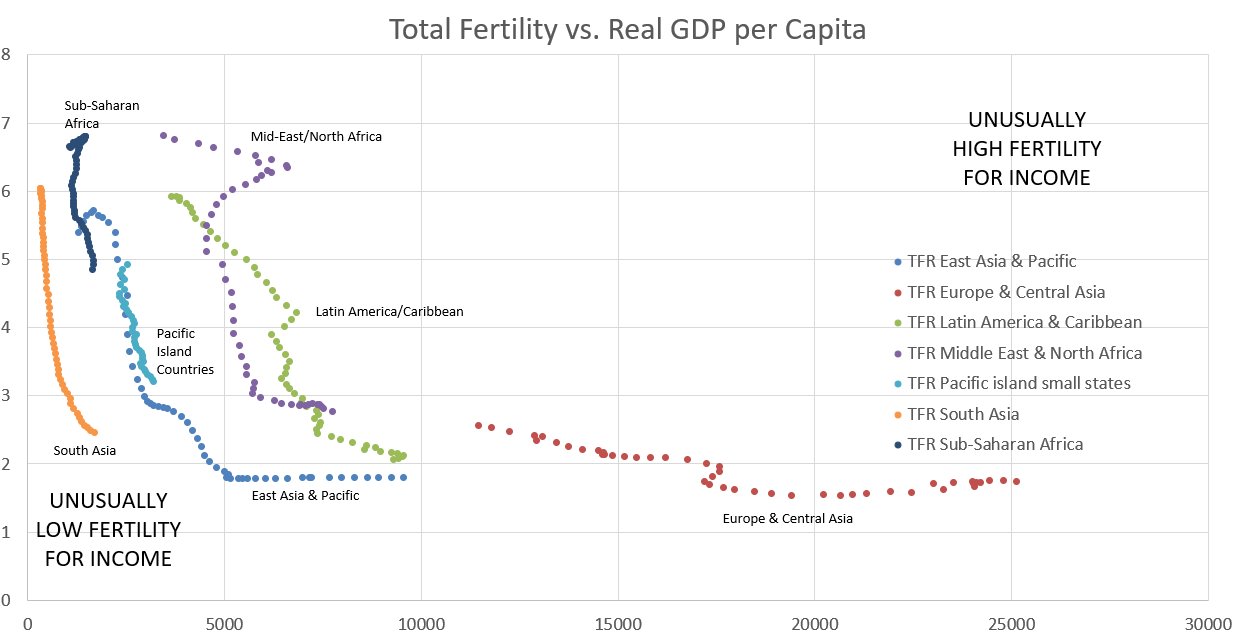Fertility for Income around the world, from Lyman StoneA new report (if you can ignore the overblown headline) looks at the massive Millennium Villages project, promoted by economist Jeffrey Sachs. It spent a *lot* in Ghana (a budget of Million from a variety of sources, including local government and communities) on economic makeovers of selected locales, but did not have an overall effect on poverty, hunger, or many of the other outcomes it set out to improve. Full report here.The image above comes from Lyman Stone, showing that Africa does not have particularly high fertility when you take income into account. Or as he explains, fertility isn’t the problem, poverty is the problem.A new Vox section, Future Perfect, focuses on solutions to social problems, and also has a podcast (of
Topics:
Jeff Mosenkis (IPA) considers the following as important: cash transfers, demographics, development, Economics, fertility, Ghana, graduation model, Jeffrey Sachs, links, Millennium Villages, miscellany, news, Research, Sweden, ultrapoor, ultrapoor graduation
This could be interesting, too:
Lars Pålsson Syll writes Schuldenbremse bye bye
Lars Pålsson Syll writes What’s wrong with economics — a primer
Lars Pålsson Syll writes Krigskeynesianismens återkomst
Lars Pålsson Syll writes Finding Eigenvalues and Eigenvectors (student stuff)

- A new report (if you can ignore the overblown headline) looks at the massive Millennium Villages project, promoted by economist Jeffrey Sachs. It spent a *lot* in Ghana (a budget of $27 Million from a variety of sources, including local government and communities) on economic makeovers of selected locales, but did not have an overall effect on poverty, hunger, or many of the other outcomes it set out to improve. Full report here.
- The image above comes from Lyman Stone, showing that Africa does not have particularly high fertility when you take income into account. Or as he explains, fertility isn’t the problem, poverty is the problem.
- A new Vox section, Future Perfect, focuses on solutions to social problems, and also has a podcast (of course).
- You’ve probably seen excitement in recent years over the idea of just giving poor cash, but it’s important to remember cash alone helps in some ways but isn’t a panacea. This article looks at work by my IPA colleagues and others starting to compare cash alone to a 6-pronged approach called the “Graduation Model” for the world’s poorest, living on less than $1.90 a day.
- Baird, McKenzie, and Ozler write in VoxDev about why the classic econ 101 trade-off between leisure and labor (as people get more money they should work less) doesn’t seem to apply when it comes to cash transfers to the poor.
- Federal judges who participated in a right-leaning economics training subsequently used more economics language and ruled more conservatively (against environmental and labor regulations, and harsher criminal sentences), so professors, wield your powers wisely. (Boing Boing article summarizing it)
- It sounds like Kanye West’s meeting with Ugandan Perpetual President Museveni was even weirder than you’d expect.
- And, a nice op-ed (with some help from a journalist) from the eight-year-old Swedish girl who found the 1,500-year-old sword in the lake some time ago, as her father was rushing her so he could watch the World Cup finals:
I was yelling, “I found a sword, I found a sword!” Daddy went to show it to our neighbours, whose family has lived in the village for more than 100 years, and they said it looked like a Viking sword. Daddy didn’t get to watch the football in the end.
